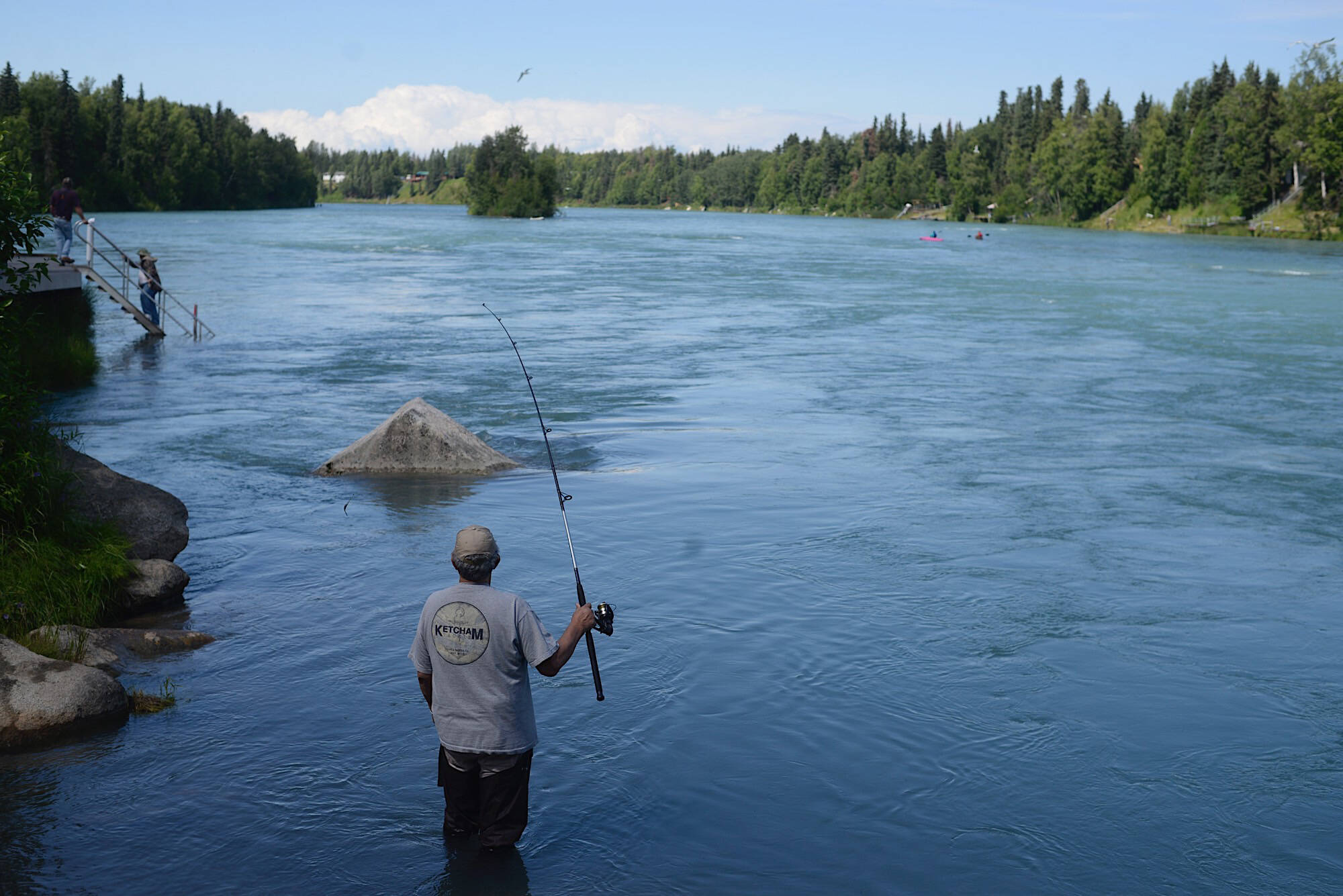A series of 11 Emergency Orders were issued by the Alaska Department of Fish and Game’s Division of Sport Fish on Feb. 2 for the Southcentral region, each implementing a restriction on king salmon fishing, mostly around the Kenai Peninsula.
Most of the orders concern closures of various fisheries, though some allow for fishing for hatchery salmon or participating in catch and release.
The emergency orders were each accompanied by a specific release, but across all of the releases, the reasoning is the same. King salmon forecasts remain low, below escapement goals.
“Based on the preseason king salmon forecasts, it looks like 2023 will be another year in this low productivity period of Cook Inlet king salmon,” Area Management Biologist Mike Booz said in one release. “These progressively restrictive preseason management actions are needed to ensure that we get as many fish as possible into the escapement for these streams.”
In another release, Area Management Biologist Sam Ivey said that ongoing issues with king salmon runs have caused closures in these fisheries for more than a decade.
“King salmon runs in Cook Inlet are anticipated to be especially poor in 2023,” Ivey says. “Major king salmon fisheries in this area of Cook Inlet have been closed in regulation since 2011.”
In the Kenai River, both early-run and late-run king salmon sport fisheries will be closed. The closure is in effect from the mouth of the river upstream to Skilak Lake’s outlet. Any king salmon caught while fishing for other species must be immediately released.
The early-run fishery is closed by Emergency Order 2-KS-1-10-23, effective from May 1 to July 31. The late-run fishery is closed by Emergency Order 2-KS-11-23, effective from July 1 to July 31.
“In an effort to protect Kenai River early-run king salmon and in compliance with the regulatory management plan, the early-run king salmon fishery is closed to sport fishing in an effort to meet the early-run escapement goal,” Acting Area Management Biologist Jenny Gates said in a release.
In the Kasilof River, daily fishing hours will be reduced from June 15 to June 24. The fishery will only be open for six hours each day. From June 15 through June 18, those six hours will be from 1 p.m. to 7 p.m., from June 19 through June 24, those hours will be 4 p.m. to 10 p.m. The restriction is implemented by Emergency Order 2-KS-1-09-23.
Also in the Kasilof River, Emergency Order 2-KS-1-08-23 will prohibit the retention of natural wild king salmon, only allowing for the retention of hatchery salmon. Hatchery salmon are identifiable by the lack of an adipose fin. The bag and possession limit will be two hatchery-produced fish. The order is effective from May 1 until June 30.
Part of that same order is a restriction to only one single-hook, baited or unbaited, artificial lure starting May 16 and effective until June 30.
A similar order will be in place for the Ninilchik River.
Emergency Order 2-KS-7-12-23 will change all king salmon bag and possession limits in the Ninilchik River to hatchery king salmon only. In the Ninilchik River, bag limits for hatchery king salmon that are 20 inches or greater will increase from one to two, while the limit for those fewer than 20 inches will be 10. Bait will be allowed, but gear will be restricted to one single-hook. Hatchery king salmon are recognized by a missing adipose fin and healed adipose fin clip scar. Wild king salmon, those with an adipose fin, must be immediately released. The order is effective from May 27 to Oct. 31.
Anchor River and Deep Creek will be closed to all sport fishing by Emergency Order 2-KS-7-13-23. The order is effective from May 20 until July 15.
In the Lower Cook Inlet salt waters, described as anywhere south of the latitude of Bluff Point, bag limits for king salmon will be reduced from two to one. The order, 2-KS-7-14-23, is in effect from May 15 to July 31.
Sport fishing for king salmon will be closed in all Cook Inlet salt waters north of the latitude of Bluff Point. Any salmon accidentally caught must immediately be released. The order, 2-KS-7-15-23, is in effect from May 15 to July 31.
Three of the orders were also implemented for the West Cook Inlet, closer to the Susitna River.
Emergency Order 2-KS-2-06-23 closes all waters of the West Cook Inlet Management Area to sport fishing for king salmon. Any king salmon accidentally caught must be released. The West Cook Inlet Management Area includes all freshwater drainages flowing into Cook Inlet from Cape Douglas north to the Susitna River. The order is effective from May 1 to June 30.
In the Little Susitna River, king salmon sport fishing will be restricted to catch and release by Emergency Order 2-KS-2-07-23. A gear limit of one unbaited, single-hook, artificial lure is also imposed by the order.
King salmon fishing will be closed in all but one of the Susitna River drainages by Emergency Order 2-KS-2-05-23. Yentna River drainage will be the only open drainage, but will be restricted to catch and release. Like the Little Susitna River, a gear limit of one unbaited, single-hook, artificial lure is included in the order, effective from May 1 to July 13.
To view the full text of each Emergency Order, visit adfg.alaska.gov/sf/EONR/.
Reach reporter Jake Dye at jacob.dye@peninsulaclarion.com.


